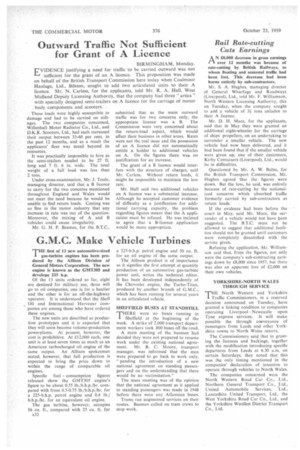G.M.C. Make Vehicle Turbines
Page 34

If you've noticed an error in this article please click here to report it so we can fix it.
TilE first of 13 new automotive-sized gas-turbine engines has been produced by the Allison Division of General Motors Corporation. The new engine is known as the GMT305 and develops 225 h.p.
Of the 13 units ordered so far, eight are destined for military use, three will go to oil companies; one is for a haulier and the other is for an off-the-highway operator. It is understood that the Shell Oil and International Harvester companies are among those who have ordered these engines.
The new units are described as production prototypes and it is expected that they will soon become volume-production powerplants. At present, however, the cost is prohibitive. At £12,000 each, one unit is at least seven times as much as an American turbocharged oil engine of the same output. An Allison spokesman stated, however, that full production is expected to bring the price down to within the range of comparable oil engines.
Specific fuel consumption figures released show the GMT305 engine's figure to be about 0.55 lb./b.h.p./hr. compared with from 0.5-035 lb./b.h.p./hr. for a 225-b.b.p. petrol engine and 0.4 lb./ b.h.p,/hr. for an equivalent oil engine.
The gas turbine, however, occupies 16 cu. ft., compared with 25 Cu. ft for A32 a 225-b.h.p. petrol engine and 50 Cu. ft. for an oil engine of the same output.
The Allison product is of importance as it signifies the first attempt at quantity production of an automotive gas-turbine power unit, writes the technical editor. It has been developed independently of the Chevrolet engine, the Turbo-Titan, produced by another branch of G.M.C., which has been running for several years in an articulated vehicle.
SHEFFIELD BUSES AT STANDSTILL THERE were no buses running in Sheffield at the beginning of the week. A strike of 2.000 transport department workers took 800 buses off the road.
A mass meeting of the busmen had decided they were not prepared to resume work under the existing national agreement. Mr. R. C. Moore, transport manager, was informed that the men were prepared to go back to work only. "pending the introduction of a new national agreement on standing passengers and on the understanding that there would be no victimization."
The mass meeting was of the opinion that the national agreement as it applied to standing passengers was made in 1948 before there were any Atlantean buses.
Trams ran augmented services on their routes. Busmen called on tram crews to stop work.




































































































